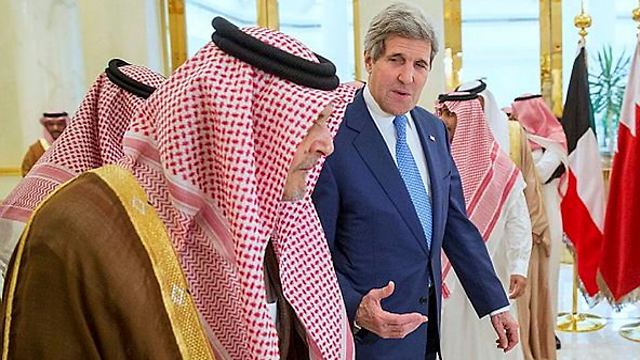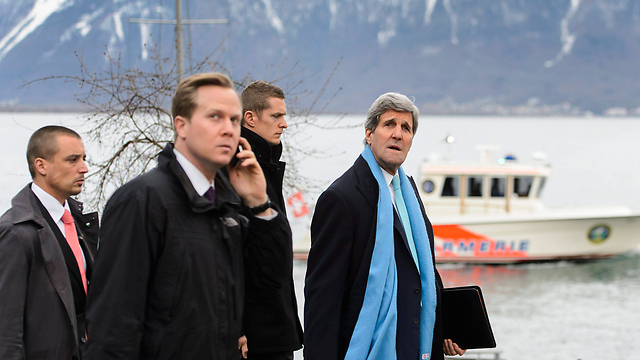
US Secretary of State John Kerry said Thursday that Washington was not seeking a "grand bargain" with Iran, in reference to wider political and security cooperation, and that a nuclear deal with Tehran would address security concerns of Gulf Arab countries.
Saudi Arabia's Foreign Minister Prince Saud al-Faisal, speaking alongside Kerry in Riyadh, said Kerry had given him assurances that Washington would not forget about other Iranian behaviour in the region while it pursued a nuclear deal.
The US won't ignore Iran's actions in Syria, Lebanon, Iraq and Yemen, Kerry told Gulf officials.
A day after wrapping up the latest round of Iran nuclear negotiations in Switzerland, Kerry headed to Riyadh for talks with senior officials from the Sunni-ruled Gulf states and the new Saudi monarch, King Salman.
Saudi Foreign Minister Saud bin Faisal bin Abdulaziz Al Saud told Kerry that events in Tikrit, the Iraqi city now under Islamic State control, is a prime example of what worries SAudi Arabia, and warned that Iran was taking over Iraq.
Kerry was meeting with the foreign ministers of the Gulf Cooperation Council: Bahrain, Kuwait, Oman, Qatar, Saudi Arabia and the United Arab Emirates, all of which are unnerved by Shiite Iran's suspected pursuit of nuclear weapons and its increasing assertiveness throughout the region.
US officials said Kerry would reassure them that a deal with Tehran will not allow Iran to get the bomb and won't mean American complacency on broader security matters. Iran is actively supporting forces fighting in Syria and Iraq and is linked to Shiite rebels who recently toppled the US and Arab-backed government in Yemen.
Kerry was to tell them that no matter what happens with the Iranian nuclear talks, the US would continue to confront "Iranian expansion" and "aggressiveness" in the region and work closely with the Gulf states on security and defense capabilities, according to American officials.
Related articles:
- Kerry hits back at Israeli criticism, but says gaps remain in Iran talks
- Kerry and Zarif meet as Iran responds to US threat to leave talks
- Netanyahu in 1993: Iran will have bomb by 1999
On Yemen, the officials said Kerry would reiterate that the US supports UN efforts to promote a dialogue leading to a political transition in Yemen, which is embroiled in a political crisis that threatens to split the country. The UN-mediated talks are aimed at breaking the political stalemate between the rebels known as the Houthis and Yemeni President Abed Rabbo Mansour Hadi.
Hadi fled the capital of Sanaa after being released from house arrest last month and is now based in the southern city of Aden, from where he has been meeting foreign diplomats, including the US ambassador. Hadi has called for the relocation of embassies to Aden, as several GCC members have done already.
The United States, which closed its embassy in Sanaa last month and evacuated its diplomatic staff, has no plans to relocate to Aden, although the US ambassador to Yemen, Matthew Tueller, met with Hadi in Aden on Monday. Until the crisis is resolved and the embassy reopened, Tueller and some of his staff will be based in an office at the US Consulate in Jiddah, Saudi Arabia, the officials said.
In addition to the Iranian nuclear issue and Yemen, Kerry was also to discuss the continually deteriorating conditions in Syria and the fight against Islamic State group militants there and in Iraq.
US officials said Kerry would stress that the United States does not see a military solution to the conflict in Syria, but also does not think a political solution is possible while Syrian President Bashar Assad remains in power.

















